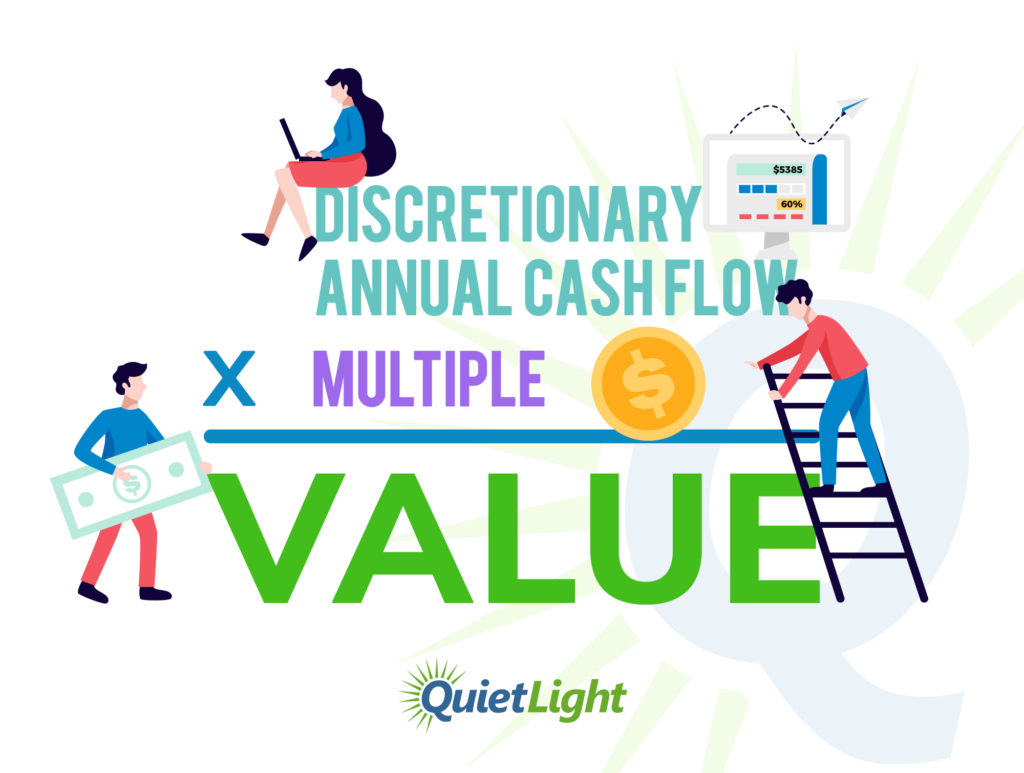Topics:
Never Miss a Beat - Get Updates Direct to Your Inbox
FILTER:


Initial Offer Price Determination in Business Acquisitions
By Quiet Light
There are several key elements to consider during the acquisition process, not the least of which is choosing your initial offer price when buying a business. If your offer is too high, you’ll likely end up overpaying for the business and realize a lower ROI. If your offer is too low, on the other hand, you’ll risk losing the deal to another buyer. Therefore, there is a lot of value in understanding how to determine the right initial offer price when buying a business.
In this article, we’ll discuss everything you need to know to choose your initial offer price when buying a business. This includes understanding the valuation process, current market conditions, and the circumstances surrounding the deal.
Related Article: A Practical Guide to Buying a Business
How the Business Valuation Process Works
Most small-to-medium-sized online businesses are valued based on an SDE multiple. Although this method applies to the vast majority of online businesses, some SaaS companies that meet certain criteria may be valued on a revenue multiple. Our Ultimate SaaS Guide addresses the situations in which a revenue multiple may be more appropriate than an SDE multiple.
“Most small-to-medium-sized online businesses are valued based on an SDE multiple.”
For the purposes of this discussion, we’ll stick with the SDE multiple valuation method since it applies to most online businesses. The basic SDE valuation formula is as follows:
Discretionary Annual Cash Flow x Multiple = Value
Also known as discretionary earnings, discretionary cash flow is a business’s raw profits. It’s what is left over after all expenses have been paid, including discretionary expenses such as travel or home-office expenses. Because even a small error in calculating SDE can translate into a significant distortion of value, it’s extremely important to establish an accurate SDE during the valuation process.
Once you calculate SDE, you multiply it by the multiple. In essence, the multiple is a number that reflects how desirable a business is as an acquisition target. During the valuation process, an Advisor will examine numerous valuation metrics to determine a fair and accurate multiple.
It’s also important to note that if a business valuation says your business is worth $1.2 million, this doesn’t mean a seller is guaranteed to receive that. It’s just a measure of what the market will likely pay. In the end, the true value of your business is the amount a buyer is willing to pay for it. Just like the stock price of a publicly traded company, a business’s value can fluctuate.


What Factors Influence the Value of a Business for Sale?
During the valuation process, a broker examines numerous factors to determine how valuable a business is. All of these factors can fall into one of four key categories, which we call the Four Pillars of Value. These pillars include:
- Growth
- Risk
- Documentation
- Transferability
Below, we’ll addressed several important subfactors that fall into one of the Four Pillars listed above.
Age of the business
How old is the business? Has it been around long enough to establish a baseline for how its profits look? While it’s possible to profit from purchasing a business that’s only been around a year or two, it’s significantly less risky to purchase an older company.
“During the valuation process, a broker examines numerous factors to determine how valuable a business is.”
Buy a Profitable Online Business
Outsmart the startup game and check out our listings. You can request a summary on any business without any further obligation.
Barriers to transferability
There’s also the question of ownership and staff. Is the business easily transferable, or does it rely on its owner to survive? Will employees be willing to stay on with the business, or will they quit after the sale?
Market conditions
The market also has a considerable impact on a business’s value. For instance, at one point a highly profitable business that sold GPS devices might have looked good on paper. However, many such businesses were rendered obsolete by smartphones.


Competition
It’s also essential to examine how competitive the market is and the foothold or unique value proposition a business has. If the business has been steadily gaining market share, that’s a great sign. If its market share has been declining, on the other hand, it could represent a significant business risk. What would happen if the business’s market share continues to shrink?
The business’s reputation
Let’s say you’ve discovered a promising business listing. Before you make an offer, however, be sure to do your research. What are customers or clients saying about them? Are there any existing or pending lawsuits or liens against the business? If the answers to these questions are dubious, it could pose an additional risk that could lower the business’s value.
Also, a business might be popular with its customers, but if it has a terrible relationship with its vendors or suppliers, that could be a major issue. Therefore, be sure to do your research on the business’s relationship with partners.
Assets
While not part of the Four Pillars, a business’s assets will impact its value. Typically, assets such as inventory are added to the value of the business at the time of sale to determine the final purchase price. This makes it important to pay attention to a business’s assets when evaluating whether or not you want to make an offer.
“If the business has been steadily gaining market share, that’s a great sign. If its market share has been declining, on the other hand, it could represent a significant business risk.”
Such assets shouldn’t be confused with add-backs, which are expenses “added back” to net income to determine SDE.


The reason for the sale
If the seller simply wants to make an exit and pursue other opportunities, great. But there are many other reasons someone might sell a business, and not all of them are good. The company might be struggling, there might be a dispute between business partners, or the owner might be facing financial difficulties. Therefore, it’s always best to identify why a seller wants to exit their business, as the answer may inform your decision about making an offer.
Need Growth Capital or an Experienced Ecommerce Attorney?
Visit Our Partner Page to View a List of Experienced Partners We’ve Worked with Over the Years.
Buy a Profitable Online Business
Outsmart the startup game and check out our listings. You can request a summary on any business without any further obligation.
Looking at Comparable Businesses
Many buyers look to recent transaction reports to see what other buyers have paid for comparable companies. Some marketplaces even publish these reports, using them as a way to determine the “fair asking price” for a given business. While this data can be helpful, it shouldn’t be taken as a conclusive indication of what a business is truly worth.
“While looking at other deals can offer some insight, you shouldn’t rely too heavily on the average purchase price of a business when you’re going to make an offer.”


As an example, let’s say you run a report with BizBuySell.com and graph out the last 40 deals they recorded to determine just how easy it would be to predict a business’s value based on the data. At first, it seems that the data offers a simple, straightforward answer.
Based on this report, it appears that the average SDE multiple is 2.03. When you examine the data more carefully, however, it becomes clear that almost none of their reported sales actually sold for this multiple. Some businesses sold for significantly more or less than that amount.
While looking at other deals can offer some insight, you shouldn’t rely too heavily on the average purchase price of a business when you’re going to make an offer. Rather, elements such as growth prospects and business risks play a much more important role in determining a business’s true value.
How a business’s sale price is influenced by buyers
Certain businesses will naturally be worth more to specific buyers. For instance, someone with considerable experience in web development will likely see more opportunities in a SaaS application than someone with a marketing background. Each business’s relative value will vary from one buyer to the next based on their experience, goals, and individual skill sets.
Thinking of Selling Your Business?
Get a free, individually-tailored valuation and business-readiness assessment. Sell when you're ready. Not a minute before.
How to Choose Your Initial Offer Price When Buying a Business
Understand the market
Looking at recent deals can be a good starting point when it comes to gauging the overall market for online businesses. However, it’s important to not lump all businesses into one category solely based on metrics such as revenue or SDE. As discussed above, there are a variety of inputs that inform the valuation process. For this reason, the market is only one of several variables you should consider when trying to choose your initial offer price when buying a business.
“Each business’s relative value will vary from one buyer to the next based on their experience, goals, and individual skill sets.”
Understand the seller
Buyers sometimes make the mistake of thinking a seller is unreasonable if they want a price higher than what the market is willing to pay. This is not a correct assumption. A seller isn’t unreasonable for demanding higher than the market price.
Rather, a seller may feel their business is worth more to them than the average market value. Each seller has their own “separation value.” Only when that value comes close to or within the range of market prices does it make sense for them to sell their business.


Consider the seller’s asking price and general expectations as well as the reason they value their business so highly. If you know the seller won’t be willing to sell for less than a certain amount, that should factor into your offer decision. Of course, in some cases, you may choose to simply walk away instead of paying more than you want.
Determine how valuable the business is to you
As mentioned above, the same business may be worth more to one person than it is to another. In such a case, two buyers may choose a different initial offer price. Additionally, each person has their own set of investment criteria and goals. Therefore, it’s important to consider how valuable a given business is to you—not just how valuable it is to the market.
Ask yourself questions like:
- What are my income and ROI goals?
- How much energy and work is it going to require in order to maintain or grow monthly and quarterly cash flow?
- What skills do I have that could allow me to add significant value to the business?
- What could upend this business and disrupt cash flow?
Consider your own characteristics. If the business requires heavy SEO and you have little-to-no experience in this, then the risk is high. On the other hand, if you’re an expert when it comes to enhancing customer experience and that’s exactly what the business needs, then you might have just found the perfect acquisition target.
If you’re interested in learning more about what’s involved in the acquisition process, be sure to check out our Practical Guide to Buying a Business.
Buy a Profitable Online Business
Outsmart the startup game and check out our listings. You can request a summary on any business without any further obligation.





